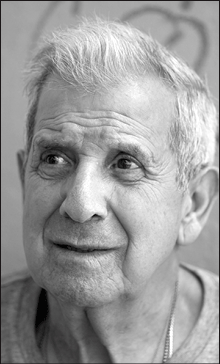By Lorcan Otway
Mike Amico spends a lot of time sitting in front of the building in which he lives on St. Mark’s Pl., feeding pigeons, complimenting pretty women, missing his beautiful wife, and telling younger folks what things were like when. …
Mike deserves some time to relax and enjoy life. On June 6, 1944, a tough kid from a tougher neighborhood ran through the Normandy surf into a confusion of unimaginable noise, fear and death. Mike’s eyes gaze off somewhere else when he remembers that day. He does not say much, other than “That was some day. …” and he remembers how many of the others he trained with, became friends with, depended on and who depended on him died that day. He does not talk much about the worst of the war. He was there, saw it, lived it, but prefers to remember his friends and family, his young wife, who is always young and pretty in his memories.
Mike grew up in the neighborhood in which he still lives, it was called the Lower East Side then. Italian kids like Mike often joined gangs, had heroes who were “good fellows” or were “made men.” He talks about mob hits on First Ave., long ago, ethnic battles and fights over turf. As a young man, he also saw his ancestral home, Italy. He walked across Italy with his unit, driving the armies of Fascism out. He remembers the girls, the wine, the beautiful land, and he remembers the terrible fighting and loss.
Mike, however, is not one of those vets who dwells on the worst of war. He remembers trying to grab hold of a little life in the face of all that death. He greets passing tourists in their own language, Germans, Italians, French — to him the divisions of war are in the past. He laughs and says to them that he learned their language when he was there…during the war.
Mike often thinks of his brother-in-law, who he remembers was like his own brother to him. It worried him when his sister’s husband was posted to Mike’s battalion.
“I felt like I should look out for him…” Mike remembers. He also remembers hearing the explosion that killed him. “I felt terrible, but the strange thing is I couldn’t cry.”
Mike came home and he and his wife had four children. One son, Michael, died as a baby. His two daughters, Maria and Jackie, married well. His surviving son, Louie, incurred his father’s anger when he volunteered to go to Vietnam straight from high school. Mike wanted his son to go to college, not into the service, and he tried to dissuade him by telling him about the terrible things he saw when he went to war. But it was too late. His son went to Vietnam, and returned suffering the effects of Agent Orange, a defoliant used to clear jungles that was found to produce a host of serious health issues years after exposure. Mike is no longer angry, only worried for his son.
Mike’s wife died more than 10 years ago. He still keeps all her things in the house, and cannot even bear to throw away her clothes. A friend of Mike’s says it’s like she’s still there.
Now in his early 80s, Mike is retired from his job, driving a truck for a restaurant supply company. But that war, that time which seems so long ago, so unique in its brutality and evil, still lives in Mike’s eyes as he feeds his pigeons on his St. Mark’s Pl. stoop.





































